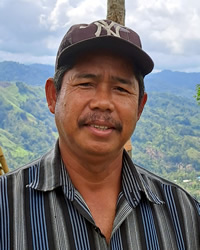Pannei in Indonesia

Photo Source:
Anonymous
|
Send Joshua Project a map of this people group.
|
| People Name: | Pannei |
| Country: | Indonesia |
| 10/40 Window: | Yes |
| Population: | 12,000 |
| World Population: | 12,000 |
| Primary Language: | Pannei |
| Primary Religion: | Islam |
| Christian Adherents: | 0.50 % |
| Evangelicals: | 0.00 % |
| Scripture: | Translation Started |
| Ministry Resources: | No |
| Jesus Film: | No |
| Audio Recordings: | Yes |
| People Cluster: | Bugi-Makassar of Sulawesi |
| Affinity Bloc: | Malay Peoples |
| Progress Level: |
|
Introduction / History
The Pannei people live in the districts of Wonomulyo and Sumarorong, which are located in the Polewali Mamasa regency of the West Sulawesi province. They speak Pannei in their daily lives. This language has two dialects: Tapango and Bulo. The Pannei language is part of a larger linguistic grouping called the Pitu Ulunna Salu subfamily, which also includes the Aralle-Tabaluhan, Bambam, Dakka and Ulumanda languages.
What Are Their Lives Like?
The Pannei make their living in various ways. They work as farmers, fishermen, craftsmen, traders/merchants and government officials. The craftsmen are usually known as tukang or panre. The term tukang is used for those who are carpenters or masons. The term panre is used for those who are homebuilders (panre bola), gold and silver crafters (panre ulaweng) and blacksmiths (panre besi). They also use specific terms to describe clothing tailors (pa'jai), cloth weavers (pa'tennung) and iron manufacturers (pa'lanro). Other jobs include government positions and the military. Government officials are known as pajama kantoro (office officials), which also includes teachers. Those in the military are usually known as surodadu (soldiers). In the past, guerilla-fighters were called pa'barani (courageous persons). Initially, these warriors served the Bugis kingdom against other kingdoms, but later they fought against the Dutch colonialists. The pa'barani were reputed to always be eager to fight, engaging in conflict or war without regard for personal safety, for the glory of the king and kingdom.
What Are Their Beliefs?
Almost all the Pannei people are followers of Islam. The area where they live has many mosques (mesjid) and prayer houses (langgar) for worship. The goal of the Islamic leadership in the area is to have a mesjid or langgar within easy walking distance for each family. At the same time, traditional animistic beliefs are still strong in daily life. The services of a dukun (shaman/healer/occultist) are often sought for many purposes, including healing the sick and exorcising evil spirits. The Pannei believe in the power of spirits that inhabit sacred places and are thought to bring either misfortune or prosperity. The departed spirits of their ancestors are thought to be alive and able to watch over the behavior of both adults and children. Due to these beliefs, a system of veneration and worship of these spirits has emerged, typically taking the form of ceremonies and ritual offerings.
What Are Their Needs?
The Pannei are viewed by outsiders as being "behind the times," closed off and impoverished. If this is accurate and the Pannei are open to outside help, a wide variety of assistance could be given to help their progress. A wide range of new employment opportunities needs to be created. Formal education and vocational training in a variety of skills would be helpful. There are also many infrastructure needs in the area that could be addressed to help the Pannei people.
Prayer Points
Pray for the spiritual hunger it takes for the Pannei people to seek and find the only savior.
Pray for loving workers.
Pray for Pannei disciples who will make more disciples.